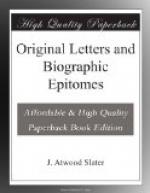To warn passengers of the starting and of the approach of trains only a moderate application of the whistle is needed, whilst for the diplomatic the discreet purpose of practical manoeuvre, namely, to draw the attention of signalmen to the passing of points by trains, extra power is requisite; but the gruesome display, I maintain, of vocative sounds tuned to an intellectual point of mood is needless.
Those daily engaged upon manual work only are not in a like manner affected, though for all reasons of civil and common honour the supercilious cry referred to should be deprecated. Rather tune and sound the whistle to two simultaneous notes in sharp, brief accent than that the chambers of the minds of the hearers of those sounds should be so continuously, remorselessly entered. Anything lengthy aggravates the auditory crisis. The stream of daily occupation with the set purpose of sedentary exploit is competent to regulate itself without an articulate “voice” from the railway companies.
I am, Sir, faithfully yours,
J. ATWOOD.SLATER
4, Hill Side, Cotham Hill, Bristol,
July 29th, 1901.
SCULPTURE.
From the WESTERN DAILY PRESS, Nov. 16th, 1901.
ALFRED STEVENS, SCULPTOR.
ADDRESS BY MR. J. ATWOOD.SLATER.
Sir,—I send you with the thought that you may wish to publish them the precise substance of my remarks verbally delivered at the meeting of the Bristol Society of Architects, November 11th, on which occasion a refreshing paper upon the works of Alfred Stevens was delivered, a man of high artistic repute, whose fame in this district is but dimly recognised, being of another parent soil.
Yours faithfully,
J. ATWOOD.SLATER.
4, Hill Side, Cotham Hill, Bristol,
Nov. 12th, 1901.
Mr. Slater spoke as follows:—The importance of the moment bids me hasten with all seriousness to support the special retribution of plausible justice, amounting to adulation, which has been lavished on the labours of the distinguished English sculptor. Had it been necessary I should have travelled a greater distance to have paid with my testimony homage to the words of this evening’s lecturer. It is not saying more than the truth will allow me, or admitting more than my own poignant feelings may to such expression give justification, when I confirm with my lips the belief that I have for much time dispassionately held that Alfred Stevens, with Turner, were the first artists that England produced from the middle of the eighteenth to that of the nineteenth centuries; and that, compared with the great oracles of the past, he reasonably approaches Michael Angelo, who he unquestionably touches and sometimes surpasses. To state my views, having received elementary drawing instructions from a friend of Stevens, I think that there is evidence, in carefully examining the figures




